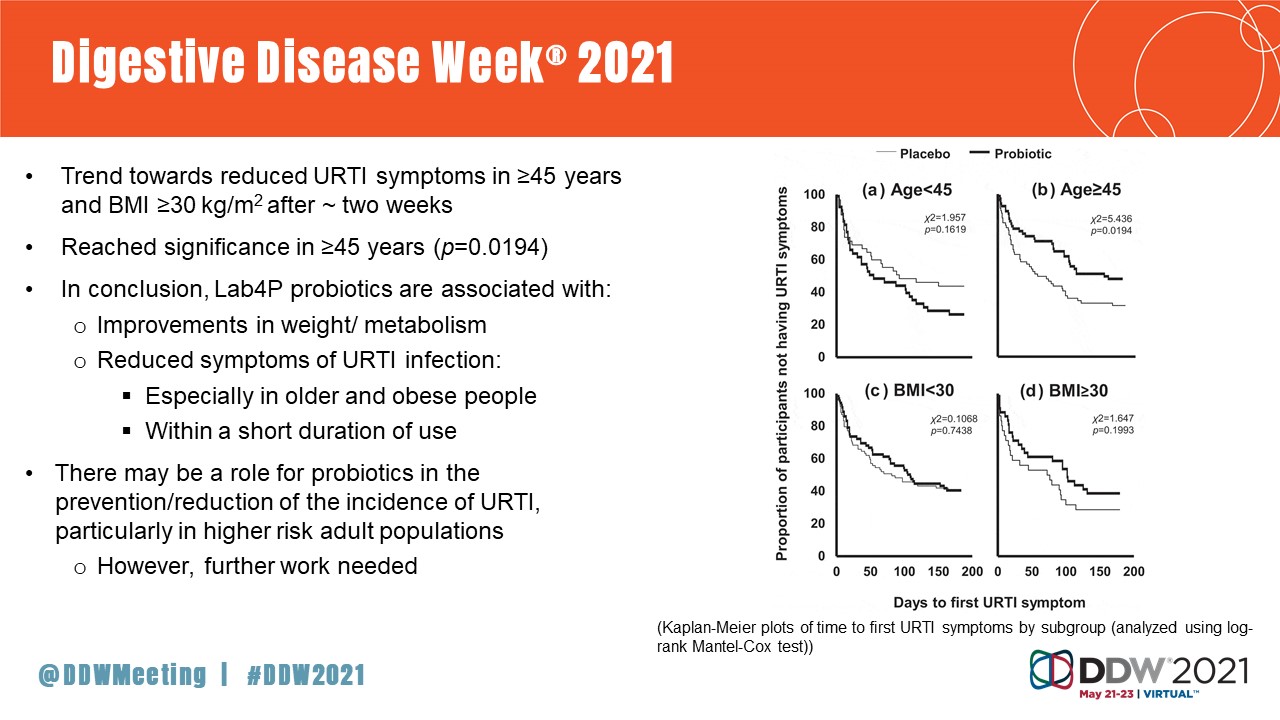
In addition to aiding weight loss, probiotics may provide additional protection against symptoms of upper respiratory tract infections (URTI) in those most susceptible to the disease — individuals who are overweight and older — according to new research to be presented at Digestive Disease Week® (DDW) 2021.
“This is not necessarily the most intuitive idea, that introducing bacteria into your gut might reduce your risk of respiratory infections,” said Benjamin Mullish, MD, lead researcher on this study and clinical lecturer in the Division of Digestive Diseases, Imperial College London, England. “But I think it’s a further piece of evidence that the gut microbiome has a complex relationship with a lot of different organ systems.”
Dr. Mullish and colleagues analyzed data from a randomized, double-blind, controlled trial of probiotic use among 220 patients who are overweight or obese (body mass index [BMI] 25–34.9 kg/m2). Participants were randomized to either daily Lab4P probiotic (50 billion colony-forming units, containing three strains of Lactobacilli and two strains of Bifidobacteria,) or placebo for six months. Participants were asked to maintain self-reported diaries of URTI symptoms (i.e., cough, sore throat, headache, muscle ache and wheezing). Researchers found:
- People receiving the probiotic experienced a significant decrease in body weight (-1.3 kg) and BMI (-0.045 kg/m2) compared with placebo.
- Probiotic use was also associated with a 27 percent decrease in overall incidence of URTI symptoms.
- Significant interactions were observed between probiotic use and age as well as probiotic use and BMI, with URTI symptoms decreasing more among people taking probiotics who were older (>45 years vs <45 years) and whose BMI was classified as obese (versus overweight).
These findings help fill an important knowledge gap about probiotic use and respiratory symptom mitigation in high-risk patients.
“With COVID, respiratory infections are very topical. And although we have good resources for the diagnosis and treatment of these infections, we don’t really have much available in terms of preventative strategies,” said Dr. Mullish. “This study suggested a pretty profound reduction in symptoms consistent with respiratory infections in people taking probiotics compared to placebo, and the people in the study were all overweight, obese and a large proportion were middle age or older. That’s in contrast to previous probiotic studies, that were focused on healthier or younger people or those with a normal BMI.”
These results could serve as a launchpad for mechanistic studies to explore further the putative causes behind gut microbiome interactions with the immune system. But in the meantime, they also could offer clinicians an additional new consideration for disease prevention.
“Probiotics may have a clinical role [in] respiratory infections,” Dr. Mullish summarized. “This could be an easy-to-administer, safe and cheap preventative tool against respiratory infections in these patients in the future.”
Dr. Mullish will present data from the study “Daily probiotic use is associated with a reduced rate of upper respiratory tract symptoms in overweight and obese people,” abstract 739, on Sunday, May 23, at 1:16 p.m. EDT, during the AGA Clinical Science Plenary.



